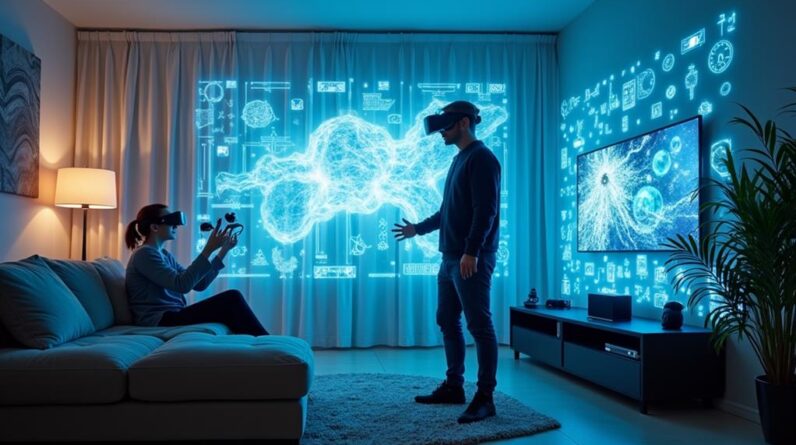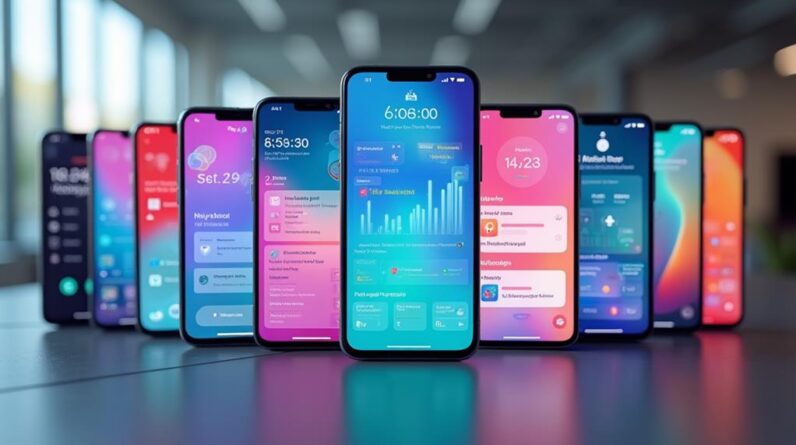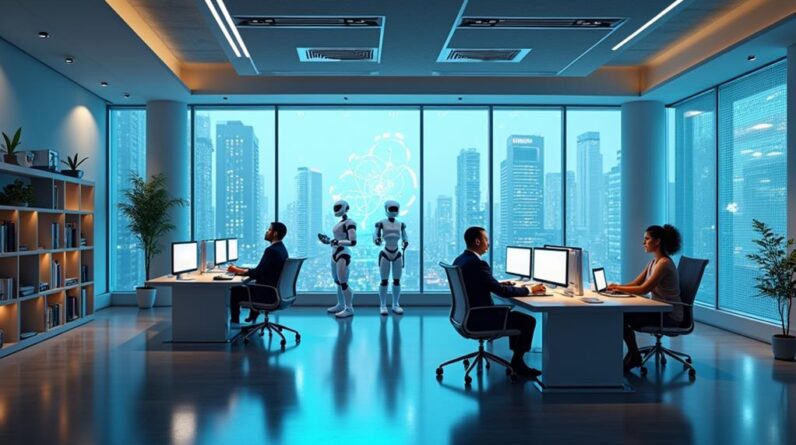
Hey Google:
Turn on the living room light. Switch on the flower. (Computer voice) I
understood "switch on Blumi". Is that correct? Yes. Hey, Google:
start vacuum cleaner Robby. (computer
voice) Okay, Robby is starting. Living in the digital age – almost everything works
here via voice control. (Tobias) Hey, Google:
dock vacuum cleaner. From the lamp to the digital
flower: we are becoming more and more networked. Welcome to the Internet of Things, where more and more devices are coming online
and collecting data. Smart devices dominate our
everyday life, keeping an eye on every movement. More and more gadgets are supposed to make
our lives more comfortable. And at the same time we reveal an ever deeper insight
into our private and intimate sphere. This is kegg. This device records
the female hormone data. It's supposed to help you get
pregnant. Practically. But what happens
to the ever-increasing mountain of data? Are we in danger of being
constantly monitored? Or is this technology
also an opportunity? "Einstein" about the Internet
of Everything that is everywhere.
I'll admit I'm
a bit of a techie. I like technical gadgets that
are supposed to make everyday life easier for us. But they are
also little spies who constantly
collect personal data. That's why I sometimes wonder
where this will lead to. We
researched this topic and came across an exciting documentary
by Canadian filmmaker and digitization
expert Brett Gaylor. In addition to his job, he is
also a father of two – and not the only one who is completely under the
spell of these digital devices.
I don't stand a chance against a screen. The screens are winning. It
seems to Brett that everything will soon be connected to the Internet. So he wondered
how this could happen and what the consequences might be. CES – now it's getting nerdy. His research trip began at
America's largest electronics trade fair : CES, where the latest
and sometimes most absurd gadgets are presented. Hi. What is that?
– An automatic litter box. With internet connection?
– Yes. What is that?
– A smart sprinkler system. Connected to the Internet?
– Yes, of course.
Is the diaper
connected to the internet? – Yes. It measures how full the diaper is
and whether it is large or small. The trend of the year
is the totally connected home. This is our smart kitchen sink. It works
without touch or manually. And you can
also turn the water on and off with voice recognition via Apple, Google or Amazon
. So with Google.
This is our new, smart toilet,
the Numi 2.0. Amazon's Alexa is integrated. You can adjust the mood in the bathroom
: play music, light .. This toilet system can do what Alexa can
do.
I don't need an internet presence on the toilet. Why are you developing this? The system is intended to enrich the stay
in the bathroom. But
microphones would be placed in my toilet? Yes, they are built-in mics. But like Alexa or Google Home
, the utility makes sense. Can I turn off the microphone? Naturally. As always
with Amazon and Google. – OK. A microphone in my toilet… The tech companies want to
make themselves indispensable everywhere. Therefore, all household appliances must now become
"smart". Open trash can. At CES you can actually see the competition
between Google and Amazon. Who is ahead?
Which smart home is more efficient? Who will win the race
for smart technologies? These companies have
a good insight into your life.
Computers are now in the bedroom,
in the living room. You hear everything. Computers become confidants
, friends. It's clear why Google and
Amazon develop such gadgets. Google is not a search engine, Google wants to know as much as possible
about you. For Brett Gaylor, it feels like
yesterday when he
just checked out Google. Today, the company
even listens in its bathroom. Houses go online
and nobody knows the consequences. But that is only the beginning. According to Wikipedia, 30 billion devices were already
connected to the Internet of Things by 2020. A pizza delivery drone. This development
is the logical consequence of ever smaller computers. It started with industrial computers. These were very expensive.
And you used them together. Then computers got cheaper.
And everyone had one at home. Then came the cell phones. Since then, people can be
located and tracked online. And the Internet of Things is
now putting all household appliances online. Every electrical device
has a WLAN interface. This is the Internet of Things. The Internet of Things
is a gold mine. Because the Internet of Things
is in demand. It makes life more comfortable.
And
that's what people are interested in. On a so-called Pitch Day,
start-ups present their latest developments. Here they are looking for investors. The most interesting developments
are smart devices because they have access to data. Whether it's a medical device
that improves health or devices that
can optimize industrial processes – these are all interesting ideas. Almost every start-up here wants to launch
a gadget that connects to the internet
and collects personal data – sometimes quite intimate. This is kegg, a small device that vibrates during pelvic floor exercises
. In this way, it generates countless data
about fertility. Data that can also help medical specialists
. A cool tool for the vagina. This is the curve of a healthy
woman. Here she is ovulating. This is where she has the best chance of
getting pregnant. Other women
have hormonal fluctuations.
As you can see, their fertility cycles are significantly shorter. The fertility research
is simply not that far. It's difficult for some women
. Kegg will help many women.
Half of my team consists of women. And what we develop,
we test immediately. How do you feel as a woman here?
– Mean question.
Why? So… Our market is huge. But many investors are men.
And this is a women's product. development time? – From
this to this: eight months. Wait, has a line just been
crossed here? Can the internet
analyze our bodies? Kristina's start-up walks
a fine line here, just like implants
or body trackers. Companies
measure our heartbeat , breathing, our sleep.
The data goes
to a cloud via smartphones. And there they become a resource. Companies can use them –
but also sell them. Data exchange
is a huge market. Data is collected and sold, mostly for marketing and advertising. But now more and more often
in the healthcare sector. The health insurance companies will
assess you based on what your data
suggest about your health. An unhealthy lifestyle
leads to unhealthy habits. A woman who orders plus sizes online
is overweight and therefore more prone to depression
, which means higher treatment costs and therefore
higher contributions. There are more and more devices
collecting our physical data. But the technology
outperforms the law.
The customers
are legally unprotected. They have no idea
what is happening to their data. This is Eric. He suffers from sleep apnea
and sleeps with a respirator. I snore extremely loudly.
And my wife can't sleep. That's why I
have to wear this impossible mask that blows air in my face while I sleep
. What do you not do for love? What Eric didn't know: His insurance company recorded
his snoring to see if he was using the mask correctly.
Then they called him. "We know you're
not using the device properly." I didn't understand
what the lady meant by that. "They
only wore the mask for 3 hours on Tuesday, on Wednesday it was 4 hours." That's the limit. This evidence data
was then used against Eric. His health insurance
therefore did not pay him for a new mask later. So weird: They don't want to pay me for
a new mask, even though I explained to them that
I haven't used it that often because it doesn't fit me properly –
crazy.
That's why we developed kegg. Kegg is the only device
for women that
measures and records fertility data in detail. This data also helps gynecologists
or research. Because we also generate data that we still
have no idea what they actually mean.
You will hate the fertility clinics. Our winner is: kegg.
Come to us. * She laughs happily. * Our customers want this information
about their fertility. We will treat this data
confidentially. If possible, I will also
avoid data sales to third parties. I don't want women
with fertility problems
to have to pay higher health insurance premiums.
Nobody should be disadvantaged because of their
data. Kristina's attitude
is admirable. Nevertheless
, the customer is not legally protected. It can also get complicated when multiple people have access
to the same smart devices. Comfort becomes a nightmare. My name is Ferial Nijem and I have
experienced domestic and technological violence. My ex-boyfriend
tortured and controlled me with my smart home. He could
access the apps that control the smart home from anywhere. It didn't have to be here, it could be thousands of
miles away. He was regularly
accessing the controls and kept waking me up, causing sleep deprivation
and wrecking my psyche. For example, at 1 a.m.
the stereo suddenly turned on and played loud, heavy music. Of course, I
then turned on the light and wanted to turn off the music.
But he was in control
of everything. He kept turning the
lights on and off, and also the television
and stereo. Sometimes it took about 6 hours. His goal was simply
to humiliate me, to control me. In my own home. Despite therapy
, I'm still feeling bad. The memories of those nights
keep catching up with me. How powerless I felt. We all give up some of our
autonomy and power when we use these devices
– all the time. Domestic violence
with the smart home – this shows us
how far it can go. How much self-determination and power
do I give up for more and
more supposedly smart comfort? When I vacuum or watch TV
, Google knows and can piece together the puzzle of
my habits .
How does Brett Gaylor
deal with this dilemma? I discussed this
with him during a video call. I'll admit:
I'm a bit of a tech freak. I love technical gadgets like my Google Assistant
or my smart vacuum cleaner. Still, I have concerns
about my data. What exactly is being collected
and what is being done with it? What do you think about that? Many people say
they have nothing to hide. They say, "Who cares
where I ate sushi?" But it's about the big picture
of all of us that Google creates with that data. This can lead to unpredictable
prejudices or even have consequences later. I think we just have to think
carefully about what data we
want to share about ourselves and others. But what do you think, how do we manage to steer the internet in
the right direction? The Internet
is now part of everyday life.
As a country's government, you have to take this fact into account when making important
decisions. In Europe, the data protection
regulation was brought into being. This was
an extremely important law. A role model for the whole world. One should always remember that the Internet is a public
place and treat it as such.
Thank you for your time.
Have a nice day. You too.
– Bye, thank you. After all, the authorities are trying to
tackle the issue of data protection better. In the USA, for example, they repeatedly quoted the leaders of
the big tech companies and imposed billions in fines. With our business model
we are destroying social structures. Shame yourself.
– I am guilty.

I'm sorry,
I didn't want that. I'm sorry. I'm really sorry. Jeremy Rifkin
explores times of extreme change. He discovered a pattern
that keeps repeating itself. We are currently experiencing
a global digital revolution. I say this
because I have already analyzed past technological
turning points. What struck me was that there is a clear
, repeating pattern to how such technological
revolutions come about. Rifkin was able to create a
three-step guide. The first industrial revolution
sparked the discovery of coal.
Thanks to it,
new possibilities of communication emerged, e.g. the steam-powered printing
of newspapers. And with the invention of the steam locomotive , trade in goods developed
on a grand scale. The first logistics concepts
emerged in new urban centers and with them capitalism. The second revolution
proceeded in the same way, this time initiated
by the telephone. A momentous invention. You just spoke
into an earpiece and your voice
traveled around the world – thousands of kilometers
at the speed of light. Then radio and television followed. This was only made possible by a
new source of energy: crude oil! Texas had a lot of petroleum. Henry Ford's internal combustion engines
were powered by it, and national sales markets
became global. This changed our ways of life. The last two
revolutions meant that we are now
stuck in a major climate crisis. We all feel it: the second industrial revolution is
coming to an end.
And the third
is just around the corner. It's taking place now. After 30 years of the Internet
, 3.5 billion people are connected. This digitization
of communication is happening at the same time as the
development of renewable energies. The excess energy flows back
into the digital supply network. Communication and energy
are already online, autonomous vehicles
and digital traffic logistics are in the starting blocks. The third industrial revolution
is here. Communication, renewable energy,
mobility – everything is digital. It is again these three things that provide for
and organize a society. The higher level
is the Internet of Things. The world isn't the same
as it used to be. This is obvious. This can also be seen in
the extreme example of Shenzhen. If someone buys an electronic device
on Amazon , it probably comes from here. 90% of all electronic devices worldwide
are assembled here. In the last 30 years , the former fishing village
with 30,000 inhabitants has become a 12 million metropolis. Without Shenzhen, there would be
no multinationals like Tencent, Alibaba and HUAWEI. This is more than a high-tech market. Here lies the origin of the world's most efficient
technology supply chain.
Every order with a mouse click
ends up here at one of these stands. Each booth is owned by
a different technology company. For inventors of new devices
, Shenzhen is a revelation. Because this is where all the individual parts are stored.
Like many other start-ups, Kristina also ended up here to build a first prototype of
her kegg.
A prototype can be built quickly in Shenzhen. In the US, it takes
forever from ordering to manufacturing. Here it takes a day.
This subway station didn't exist last year. They're extremely fast. China is about to become the leading nation of the third
industrial revolution. The state power supply network
in China is currently being
expanded and digitized for billions. The goal: higher capacities,
longer distances, lower transmission losses, etc. In addition, China has already invested over 60 billion
in electric vehicles. And that goes on. China is stepping on the gas
and is years ahead of the West. However, this absolute digitization
in the country also has consequences. Especially for the population.
Countless sensors on cameras,
train stations, traffic lights and buildings
record people's behavior. The government in Huangzhou wants to use an app
to encourage residents to behave correctly. If I travel by ship
, I have to use my citizen app. I then pay
with so-called behavior points. * Beep,
unintelligible computer voice * It is a bonus system
based on socialist values. Every citizen
has their own behavioral value. Positive behavior
increases my worth. You can
also earn digital medals in the categories CO2 consumption, donations,
sports and leisure. So, if I go by bus
or boat or even if I walk,
my carbon footprint decreases. Then I get more bonus points. At the moment I have 589 points. So I'm
about average. Points for exemplary behavior. And the points
serve as a means of payment. China is trying
to "educate" its citizens. Anyone who dares to
cross the street on a red light or pays the rent too late is
considered antisocial and gets minus points.
13 million Chinese are on a
government blacklist. These Chinese have little chance of
taking out insurance or getting a loan for a
house. Another payment system in China
is that of Alibaba. This has
completely replaced cash. Alibaba stores all purchases and calculates the
trustworthiness of customers. Sort of
like if Amazon were a bank. The employees of these companies
know everything about me. You have an exact picture
of me: you know in detail how I live
and everything that makes me special.
They probably know me
better than I know myself. How do we prevent governments from influencing the
Internet of Things? Like hacking it and rigging
elections, as has already happened? How to ensure that Facebook,
Google, Amazon and Alibaba don't rule the internet by collecting all of
our personal information , reselling it
and thus directing our lives? Personal data has long been
a sought-after commodity. Alphabet –
Google's parent company – is also all about data. She owns Sidewalk Labs. In 2017, Eric Schmidt
from Sidewalk Labs wanted to build a new quarter in Toronto –
built on the internet. Wouldn't it be great if we applied our new technologies
to entire cities? So many things could be possible. Give us
a city and we'll get started. This was not meant as a joke: a
city with an integrated Internet. But if you look for pictures on Google, the city looks
like the space version of the 70s. The only thing that is clear is
that the Internet is everywhere and Google's sister company is
beating the advertising drum vigorously.
I increase the proportion
of green areas … … the number of trees. The new community project
is called Sidewalk Toronto. Our vision is to improve cities through
new technologies. This road is currently two lanes. If something else is needed, you can
quickly make a place out of it at the weekend. The street disappears. Or in the morning the street becomes
a wide bike path, possibly with an overpass
for pedestrians. The concept
envisages a flexible city that automatically reacts to data signals such as weather, traffic
and people. The city could react immediately. I find that exciting.
And that is possible with data. Would you
willingly provide personal information so the city
can respond to your needs? I don't want Big Brother
watching me all the time. That would be unbearable.
It's a fine line. How much data would I
want to share and most importantly: how do I share it? The only reason we collect the data is
to optimize your lives. It is important to us
to protect everyone's privacy. So how do you plan
to collect the data? It depends
on all of these factors. (Woman) Magicians
draw attention to their hands. These hands are all the talks
about buildings, cities and devices. But where no one is looking , a whole new infrastructure is
being built. For everything:
for real places, the home. It basically encompasses the whole world. The new business model
of high-tech companies. Cities are collecting more and more data
about their residents. That's not totally wrong – it can also have advantages
and make cities better. In the 19th century, explorer John Snow ended
a cholera outbreak by marking places
where those infected died. The data on the map showed that
water pumps were spreading the virus. Data collection is not just
a matter of privacy, but of privatization.
Not only toilets are going online,
the networking of entire cities
enables many more business models. Uber would be more expensive on
corners where there are a lot of people, or a start-up would direct you
to the nearest free park bench – with advertising, of course,
in exchange for the location data. The residents of the quarter were only asked:
"How do we structure the quarter?" They would have
preferred to be asked, "Do you want these changes?" "Do you want this experiment
in your neighborhood?" "Did you
agree to the implementation of the concept?" The Internet itself shows it: Its infrastructure
has been massively centralized and with it the leading
companies on the Internet. Now to repeat that in the real world
is a very bad idea. Are we now
actually privatizing our greatest asset: urban infrastructure
and services? No one answers, and it
just says, "We're working on it." But such questions should be
answered on the first day and not afterwards.
* cheers, applause * Technology and computers
are not inherently capitalist. But governments
gain power through them, and they can
build a public service
that can take advantage of these tools. Despite the resistance,
Sidewalk's plans seem unstoppable. Does the city of the future
only have two options?
To be a surveillance state or a corporate experiment? Barcelona chooses the middle ground. At the forefront of smart city design, the city eschews corporate data control
and wants transparency. We see data
as public infrastructure like water, electricity,
roads and the air we breathe. Data must be common knowledge
for our citizens. We want to move away
from surveillance capitalism and towards a digital economy
with data as a commons, where people know
how their data is being used.
Towards a digital society
for the benefit of all. In
Barcelona, for example, the data is used by the citizens of th S
art Citizen initi tive. Small sensors are printed out
and given to everyone
to collect data on CO2 emissions, pollution and noise across the city. This is how citizens manage to get the authorities to set
up quiet zones.
When you have data, you
have the power to use it. Smart Citizen is a project
by Fab Lab Barcelona. This is where information
about items. Bits become atoms. Instead of talking about
what a smart city can be , we
decided to experiment. We know how to build things.
So let's build and test them. We build
data collection and sharing tools and try
to integrate humans. Kristina Cahojova also wants to improve the lives
of millions of women. Protecting their
data may even be more profitable than selling it. Mass production in China
allows her to help all those who need help
with fertility.
This is my kegg. No fear.
This is the app. my curve Kristina will succeed. 51% of the world population
are women. And
little is invested in our health. Knowledge is power.
I have no time to lose. I am 39 years old.
I should be pregnant soon.
Thanks to a crowdfunding campaign, Kristina had so many pre-orders that she was able to bypass Amazon and
sell her product directly. Around 4,000 women are currently
on the waiting list for kegg.
That's a lot for a few weeks. The only competing product
is this: a badass thing. Good luck with it. Technology is neither good
nor bad nor neutral. Especially the internet. We can create useful
things or create things that take advantage of us. The Internet can help people
by connecting them: virtually and physically,
worldwide, at any time. We become a family. (Nellie) Today will be described as a turning point in
human history. We are all connected. Now it's really getting started. We are children of the internet. The internet is constantly changing. And now
we are setting out for new shores. Just press "Record".
Brett Gaylor
sees himself as a bad father if he simply mourns the days
without screens. Because his kids grow up with it. For them,
this digital world has long been part of life. (Brett) Where did you get these pictures from?
– (son) Found on Google. If someone says the Internet will
rule the world one day, I say: "Possibly.
But I hope it turns out differently." Me too, me too. Even if
everything changes quickly – the Internet
can also make so many things possible. I see it in a similar way to Brett: We cannot
stop technical progress. But we don't have to, because it
also has many advantages. And ultimately
it is in our own hands whether we control these devices
or they control us. That's why I think:
just switch it off more often. If you haven't switched off yet,
how about love, how to fall in love in the digital age, you can find out
here. And if you haven't already done so,
subscribe to our channel and leave a like.
Until next time. Goodbye everyone
As an Amazon Associate I earn from qualifying purchases.







